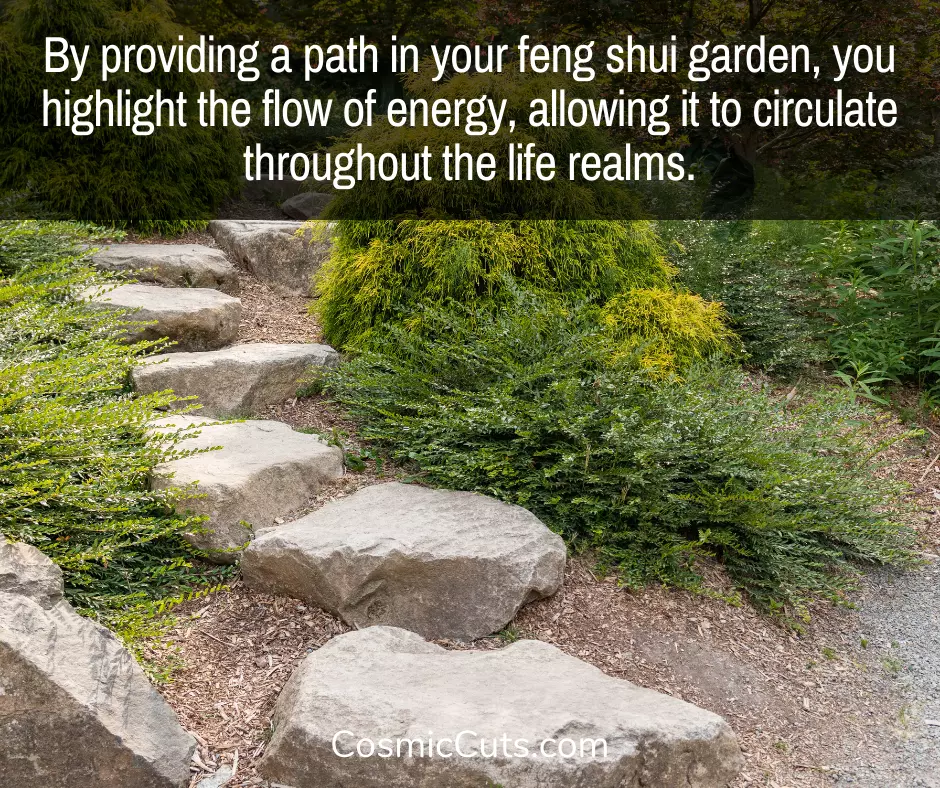Whether it's the scorching heat of summer or the frigid cold of winter, there is something truly magical about exploring nature and our place in it. And what better way to connect with the natural environment than by creating a Feng Shui garden? It not only invites the flow of energy and harmony into our lives but also creates a beautiful and serene space to unwind and find inspiration.
Balancing Your Outdoor Space
In the world of landscaping and landscape architecture, balance is essential for creating an aesthetically pleasing outdoor space. This balance involves harmonizing two key elements: the hardscape and the softscape. The hardscape encompasses manmade design elements such as buildings, furniture, and pavers, while the softscape includes plants, trees, and natural features like streams and forests.
Over the past year, our reliance on outdoor spaces has increased significantly, leading garden designers to find innovative ways to incorporate health mandates, such as social distancing, into their designs. By blending the hardscape and softscape features, they have created landscaped areas that subtly indicate the importance of personal space.
Embracing the Harmony of Feng Shui
For thousands of years, the Chinese Taoist tradition of Feng shui has emphasized the harmonious relationship between human life and nature. Feng shui, which translates to "wind water," is a philosophy that encompasses elements of philosophy, art, and science. By applying Feng shui principles to our outdoor spaces, we invite peace, prosperity, and balance to flow from the earth into our lives.
At the core of Feng shui is the idea of creating an "unencumbered flow of energy." By designing a stable space that combines flow, grounding, and positive energy, you can create an outdoor sanctuary that inspires and calms you.
 Image: Feng shui outdoor water fountain
Image: Feng shui outdoor water fountain
Understanding the Key Concepts of Feng Shui
Before diving into the design process, let's explore a few foundational concepts of Feng shui:
Yin and Yang in the Garden
Yin and Yang represent the balance of energy and can guide your color choices in a Feng shui garden. Yin energy is passive and feminine, representing calmness and introspection. To integrate Yin energy into your garden, use cool colors in secluded areas that offer privacy. On the other hand, Yang energy is active and masculine, bringing motivation and inspiration. Incorporate warm colors in prominent areas that catch the eye. This creates a vibrant energy that radiates from your home.
The Five Elements of Feng Shui
Feng shui is deeply rooted in our connection to nature, and thus, it's important to integrate plants, colors, and materials that symbolize the five natural elements: Fire, Water, Metal, Earth, and Wood. Each element contributes to the delicate balance between grounding and passion, maintaining the flow of energy in your garden.
As you plan the layout and placement of your Feng shui garden décor, you'll notice the emergence of these elements. Let them guide your choices and foster harmony in your space.
 Image: Healing Gemstone Collections
Image: Healing Gemstone Collections
Energy Zones & the Bagua Map
To delve deeper into Feng shui, we turn to the Bagua map. This grid-like layout depicts eight realms of life, along with a central zone known as Tai Chi, the source of life. Each area corresponds to a specific element and season, helping you understand which features to incorporate into each zone.
It's important to align the Bagua map with the entrance to your garden. This entrance should ideally land in the North energy zone or one of the three northern areas. From there, you can plan equal spaces for each life realm, creating balance and abundance throughout.
 Image: Bagua Map
Image: Bagua Map
Choosing the Right Plants for Your Feng Shui Garden
Plants play a crucial role in harnessing the energy of the five elements in a Feng shui garden. Flowers symbolize good luck and abundance, while fruits foster fertility and prosperity in various aspects of life. Here are some plant recommendations for each element:
Fire
Plants that embody the energy of fire often bear fruit or leaves in warm, reddish colors and have triangular or conical shapes. Geraniums, holly bushes, and trees with red bark, such as the Japanese Maple, are excellent choices for fire energy.
Water
Plants associated with water tend to have darker blue or purple colors or thrive in aquatic environments. The Lotus, lilies, and the sweet potato vine are great options for evoking the water element in your garden.
Metal
Metal energy is represented by plants with white flowers and rounder leaves. Dogwood trees, jasmine, and hostas with hints of tan lines on their leaves bring the metal element to your garden.
Earth
Gingko biloba trees and various species of grasses are perfect examples of plants that signify the earth element. Their earthy tones, closer to yellow, and square-shaped foliage help establish a strong connection to the earth.
Wood
Wood is the most obvious element in a Feng shui garden. Trees like palms, pine, and bamboo embody the wood element and can create lush spaces. Additionally, herbs like rosemary, thyme, and basil should be planted in wood element zones.
Design Ideas & Tips for Your Feng Shui Garden
Now that you have a good understanding of Feng shui principles, it's time to explore some design ideas to create a harmonious and balanced outdoor sanctuary. Keep in mind that simplicity is key, so avoid overloading your garden with excessive decorations. Choose items and materials that resonate with you and contribute to the energy flow in your space. Here are some tips to get you started:
Add Crystals
Crystals not only add beauty to any garden but also maintain a deep connection with the Earth. Clear Quartz crystals can be used as natural garden sculptures, while Hematite and Black Tourmaline stones, when incorporated into architectural features, enhance the energetic frequencies of your garden.
Incorporate a Feng Shui Outdoor Water Fountain
As flow is central to Feng shui philosophy, a water fountain in your garden can provide cleansing vibrations and make room for growth and prosperity. Ensure that the water flows freely, as stagnant water can hinder energy flow. It's important to place the water feature in the correct energy zone according to the Bagua map to avoid disrupting important areas of your life.
Bring in Sound with Wind Chimes
Wind chimes can complement your water feature by bringing balance and harmony to the garden. Delicate sounds emanating from wind chimes infuse the air with energetic frequencies, creating an environment of tranquility and peace. Hang wind chimes near your fountain or in other areas that align with the Bagua map regions.
Add Statues for Symbolism
Sculptures and statues in your garden serve as powerful reminders of nature's protection and luck. Opt for statues that connect to spiritual symbols and choose sizes that are proportionate to your garden space. This ensures that the statues enhance the energy flow rather than detract from it.
Include a Bird Bath to Connect Heaven & Earth
A bird bath not only provides birds with a source of water but also symbolizes the connection between heaven and earth. Birds inspire peace and harmony, and their presence in your garden creates a deep spiritual connection. Encourage birds to take refuge in your garden by providing a bird bath, fostering a beautiful union of heaven and earth.
 Image: Feng shui garden décor
Image: Feng shui garden décor
Add Stepping-Stones for Energy Flow
Stepping-stone pathways are essential for facilitating energy flow in your garden. By creating paths, you highlight the movement of energy and allow it to circulate through different life realms. Ensure that the pathways have gentle curves rather than sharp turns to symbolize life's wandering journey. Keep the paths unblocked and open to maintain a harmonious flow.
Create a Place for Rest & Reflection
Designate a comfortable area in your garden that invites relaxation and reflection. This space should allow you to connect with nature and yourself. Consider incorporating feng shui garden plants in this area to enhance the healing energy you derive from breathing in fresh oxygen. Choose seating options that can accommodate at least two people to promote healthy relationships.
Integrate the Fire Element with a Fire Pit
A fire pit adds a touch of magic to your garden by creating a warm and inviting atmosphere. Bright orange and red plants generate fire energy, and a fire pit complements this element. Fire not only purifies the space but also empowers you on your path, illuminating even the darkest corners of your garden.
Add a Gazing Ball for Protection
A gazing ball, with its prismatic and kaleidoscopic colors, can create a radiant shield of light in your garden. It deflects negative energy patterns back to their source, preventing them from penetrating your space. This beautiful feature adds an element of protection to your garden sanctuary.
Light it Up at Night
Install solar lights in the South zone of Fame & Reputation to bring more fire energy into your garden. Choose outdoor lamps and lanterns in various shapes and sizes that emit different levels of light. Illuminate the pathways of your garden at night to ensure energy flow continues even after the sun sets.
Final Thoughts
Regardless of the size of your outdoor space, whether it's acres of land or a tiny apartment balcony, creating a feng shui garden can provide you with a sense of tranquility and balance. It allows you to connect with the gifts of nature and boosts your mood and motivation. Embrace the principles of Feng shui and design your own personal outdoor sanctuary that nurtures your well-being.
 Image: What Crystal is Best for Me
Image: What Crystal is Best for Me











